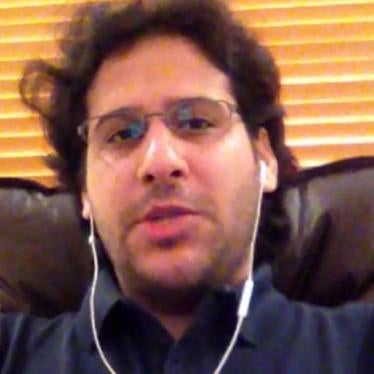The Jordanian government should drop all criminal charges of “slanderous speech” against former parliamentarian Ahmad Oweidi al-`Abbadi and release him without delay, Human Rights Watch said today. The government continues to use laws that violate international human rights standards to silence critics even though a new law prohibits imprisonment for speech offenses.
On March 21, 2007, Jordan’s parliament passed a Press and Publication Law that removed imprisonment as a punishment for speech-related offenses. Article 42 (2)f of the new law provides that: “Detention as a result of the enunciation of an opinion in speech, writing or through other means of expression is not allowed.” The new law should override penal code provisions and other laws which provide criminal sanctions for speech offences, Human Rights Watch said.
Amman’s Public Prosecutor Sabr al-Rawashda summoned Oweidi on May 3 on the basis of a personal complaint by the Minister of Interior, Eid al-Fayez. The complaint related to a letter emailed by the Jordan National Movement, which Oweidi heads, accusing the minister of corruption. The next day, the prosecutor charged Oweidi under Article 132 of the Penal Code with “disseminating … abroad news that... [the author] knows to be false or exaggerated that would impair the prestige of the state or its status.” The Public Prosecutor also charged Oweidi under Article 191 of the Penal Code with “slander [dhamm]… directed … against an official performing his duties.”
“The jailing of Ahmad Oweidi shows that Jordan’s government hasn’t shaken off its old habits of going after critics by putting them in prison,” said Sarah Leah Whitson, Middle East director at Human Rights Watch.
Prior to passage of the new law, Jordan repeatedly detained critics of the government and censored critical speech. In October 2006, for example, prosecutors charged former chief of the Royal Court, Adnan Abu Odeh, with insulting the king (lèse majesté) and stirring sectarian strife and sedition for remarks he made on Al Jazeera television.
The Jordan National Movement is not a registered party or organization in Jordan. Oweidi remains in Jordan, while other members of the movement live abroad. According to Oweidi’s defense lawyer, Muhammad `Ulwan, the complaint stems from an open letter sent in April 2007 to US Senator Harry Reid, in which Oweidi alleged that the interior minister gave Queen Rania a US$350,000 gift to elicit future favors.
`Ulwan said that the prosecutor denied Oweidi bail without providing a reason and remanded him in custody for 15 days. `Ulwan also said the authorities were keeping Oweidi in a cell with convicted prisoners in Juwaida Correctional Facility.
Freedom of expression is a fundamental right and vital to the enjoyment of other human rights, in particular the unfettered political debate that is the trademark of a democratic society. Moreover, public figures, including political figures, must expect to tolerate a higher level of criticism than ordinary private persons. In a speech to the World Economic Forum on May 18, 2007, King Abdullah II told an audience of global business leaders gathered at the Dead Sea about the importance he placed on civil society in shaping the region for the future. Jordan’s repeated criminalization of speech which does not promote violence has been inimical to free debate in Jordan.
“Anyone in Jordan who feels he or she is the victim of libel or slander should file a civil suit, where the remedies are fines and injunctions, not jail time,” Whitson said. “The government shouldn’t be in the business of jailing critics.”
Human Rights Watch also noted that international standards as well as Jordanian law require the separation of pre-trial detainees from convicted prisoners.






